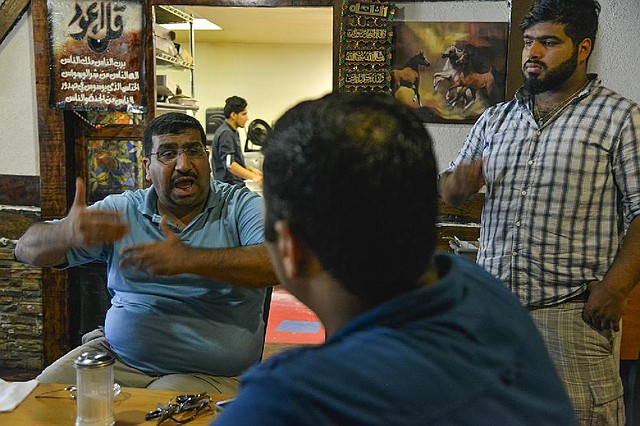Fighting back home tests loyalties, truce among Iraqis in U.S.
Kareem Mohammed, left, talks with Waleed Khohor, center, about the situation in their home country of Iraq as Mohammed's son Abbas Hadi looks on at Sinbad Restaurant, owned by prominent local Iraqi refugee Kareem Mohammed on Tuesday, June 17, 2014, in Alexandria, Va. The local Iraqi refugee community is concerned as it watches Iraq and its Shiite-led government start threatened by Sunni extremists. Illustrates IRAQ-EXILES (category a), by Pamela Constable (c) 2014, The Washington Post. Moved Saturday, June 21, 2014. (MUST CREDIT: Washington Post photo by Jahi Chikwendiu)
Sunday, June 22, 2014
WASHINGTON -- Kareem Mohammed, the proprietor of Sinbad cafe in Alexandria, Va., lives a busy and successful life thousands of miles from Iraq.
A Shiite married to a Sunni, he employs bakery workers of three faiths and loves debating Iraqi politics with customers as they smoke hookahs and watch Arabic-language newscasts over tiny glass cups of sweet Iraqi tea.
But as Mohammed's embattled homeland teeters on the brink of a violent sectarian breakup, the 42-year-old refugee finds himself pulled in two directions: yearning to join the battle against the Sunni militia known as the Islamic State of Iraq and the Levant back home, yet hoping to prevent sectarian tensions from further dividing the Iraqi exile community in the United States.
"If [President Barack] Obama gives me a plane and a gun, I will fly to Iraq and fight them myself," the former Iraqi army sergeant said, clenching his fists.
But while part of Mohammed was itching to get involved, another part was lamenting the demise of a more peaceful and tolerant society that raised him to respect Sunni and Shiite, Christian and Kurd alike. On a recent trip home to Baghdad, he was shocked by the religious "walls" that had risen everywhere.
"Everything has erupted. Nobody trusts their neighbor anymore," he said, shaking his head. "Sectarianism is in the blood."
Increasingly, Mohammed and other members of the Washington, D.C., region's large Iraqi exile community fear that the religious hostility being fanned by the Islamic State will shatter the polite but uneasy agreement to get along that Iraqis and other Muslim exile groups have maintained between their two dominant sects until now.
In conversations this week, a number of area Iraqis expressed the same concern, although mostly through hints and euphemisms.
There was no talk of anger or betrayal but a sense of distance and segregation, of seeing things through different prisms. Many Iraqi exiles from both sects are educated professionals, including engineers, teachers and business owners.
Sunnis and Shiites differ on certain core liturgical and historic aspects of Islam, with each group tilting, respectively, toward Saudi Arabia and Iran. They tend to worship at different mosques and socialize with families from the same group.
Until now, however, no overt conflict or dispute between the sects has spilled over to the emigre community.
"A lot of us have been involved in meetings and peace pacts just to make sure our communities rise above sectarian issues in their countries," said Ibrahim Hooper, an official at the Council on American-Islamic Relations, a Muslim advocacy group based in Washington. "Being here and enjoying so much freedom and diversity, we should leverage that instead of being dragged into conflicts."
But the situation in Iraq is growing nastier by the day. People are worried for the safety of their relatives in areas overrun by the Islamic State.
Sunnis fear being targeted by the extremists and accused of collaborating with them. Shiite fighters, called to arms by their leaders, are replacing trained state forces.
Some local Iraqis are seeking unorthodox ways to reinforce empathy and tolerance. Haitham Almayahi, a graduate student at Howard University, heads the group Iraqi American Youth, which focuses on sectarian bridge-building.
This weekend, the group is putting on a play about a bombing in a market, with volunteers portraying Sunni, Shiite, Kurdish and Christian victims as well as the attackers.
"Our goal is to build right-thinking youth who would never be lured into joining a terror group," said Almayahi, 38.
But, he said, young Iraqis in the United States are often "segregated" by the religious views and guidance of their parents, leading to mistrust and misinformation.
Others are trying to organize public protests that convey a common message against violence and sectarian hate. This week, a group of exiles gathered in a hotel in Springfield, Va., to discuss how to promote and prepare for a protest in front of the White House.
They wanted to speak with one voice but were afraid of offending any one group. They wanted to condemn the Islamic State but not tar all Sunnis. They wanted to criticize the elected Shiite-led government in Baghdad but support democracy.
"Look, we have to focus. When a patient is in the emergency room, you do what is needed to save him first," said Hamida Hussein, 49, a doctor who was scribbling notes on a prescription pad.
The Islamic State offensive, she said, is "like a virus or parasite that has come to destroy our country, and everyone is in danger."
A Section on 06/22/2014
